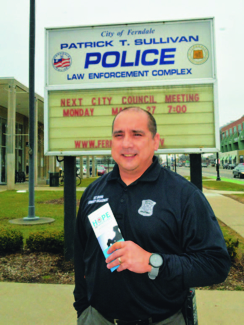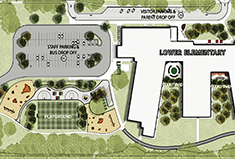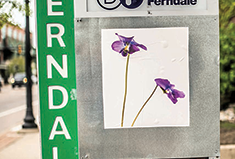Ferndale Joins Hope Not Handcuffs Program to Reduce the Stigma of Addiction
By Ingrid Sjostrand
Photo by Bernie Laframboise
One in seven Americans – or 40 million people – suffer from addiction to nicotine, alcohol or other drugs, according to the National Center on Addiction and Substance Abuse. This outnumbers those with diabetes, cancer or heart conditions. Chances are you know someone who is struggling with or recovering from addiction.
“Personally, I have had a family member addicted and if my family deals with it anybody could be dealing with it,” Ferndale Police Sergeant Baron Brown says. “Whether it’s the neighbor down the street or someone you know personally, it’s happening all around you and needs acknowledging.”
This awareness encouraged Brown to bring the Macomb-based program, Hope Not Handcuffs (HNH), to Ferndale. HNH allows individuals struggling with addiction to walk into any participating police station and immediately connect with a volunteer, called “angels,” to coordinate treatment options without fear of consequences.
Developed by Fraser-based organization Families Against Narcotics (FAN), Hope Not Handcuffs launched in February 2017 throughout Macomb County and Ferndale. Katie Donovan, Executive Vice President of FAN, says the program is based off the national nonprofit group, Police Assisted Addiction Recovery Initiative (PAARI), and its program which started in Gloucester, Mass. in June 2016. PAARI has spread to 150 police departments in 28 states.
“We have been following the program for some time, were impressed with its creativeness, the effectiveness and how it was not only helping those struggling with addiction; they also saw reduction in crime, ER visits and less money spent in the judicial system,” Donovan says.
After developing HNH, FAN reached out to members of the community, including EMS, health departments and Macomb County law enforcement to gauge their interest. The response was overwhelming, with all police agencies in the county wanting to participate. While the program had not yet been extended to Oakland County, Brown reached out to FAN about including Ferndale.
“We desperately needed to be involved. I approached our Captain, our Chief and City Manager and we all think it’s an excellent program that we can offer not only our citizens, but everyone in the community,” Brown says. “And community doesn’t just mean the people that live in Ferndale; I always say its community with a big ‘C’ because it includes everyone who comes onto our streets.” Donovan says they are working to expand the program into other areas and that the success so far has been inspirational.
“In its first month – albeit the shortest month of the year – in 28 days we assisted 72 people into treatment. We are so proud of these numbers!” she says. “We have had many police departments reach out, wanting to know more and how they can implement in their own communities, even from different states! This is creating a movement across the nation, which just gives me chills!”
While it’s too early to notice a decrease in crime rates, Brown has seen an impact in Ferndale too – with 12 people coming to the station so far and ten of those currently in treatment through HNH.
Brown is the first to admit that law enforcement doesn’t have the best reputation among addicts, but is hoping to change that perception with HNH.
“Usually police and addicts aren’t two people who are standing in the same room working together, and when people who you wouldn’t expect to trust or rely on the police are coming to us for help it says a lot,” he says. “We just want to spread that treatment is out there and if people – even the police – are wanting you to get help, it shows just how serious this problem is.”
When an individual comes into the station, police will follow standard procedures including a pat-down and a search in the criminal database to ensure the safety of the volunteers from HNH. Nonviolent warrants or a criminal record shouldn’t stop people from seeking treatment, Brown encourages.
“All the things we thought could be fixed by arresting people were all wrong, and we are changing the way we think about addiction,” he says.
“We aren’t looking for lesser charges – shoplifting warrants for example – we will deal with those things down the road. We consider that part of your recovery. Once you have been in treatment and are working toward recovery, we will handle those warrants.”
But for those that still have doubts, Donovan says there are other options.
“If they are uncomfortable walking in, we have an online form they can fill out and an angel will be assigned to them. It can all be done over the phone, as well,” she offers.
Angels are all members of the community and anyone can fill out an application on the FAN website.
“The requirements are passion, believing addiction is a disease and compassion for the addict. All walks of life have volunteered, from people in recovery themselves, stay-at-home moms, grandmas, a retired deputy sheriff, EMS, teachers, nurses, it’s just truly incredible,” Donovan says.
“I have seen such immense passion from our volunteer angels. They will stop at nothing to help someone, night or day. We even had one angel who slept in his clothes, in case he got a call in the middle of the night.”
FAN works with treatment facilities nationwide and can help anyone, regardless of their insurance, to find the best match for them. Hope Not Handcuffs doesn’t just stop at getting someone into treatment either.
“Once they finish a program, we can help them continue their recovery by setting them up with a recovery coach, outpatient therapy, sober living and getting involved in the community again as a productive member of society,” Donovan says.



